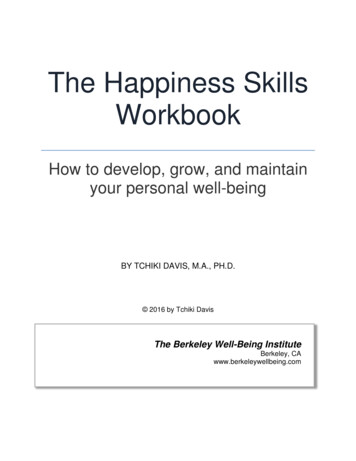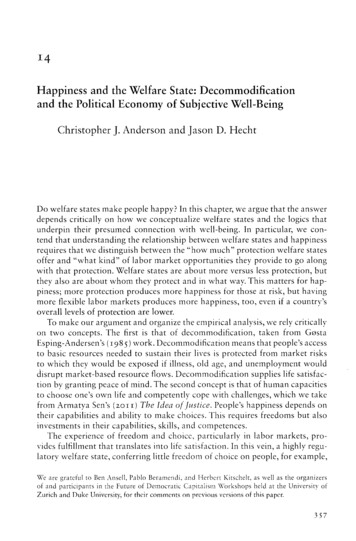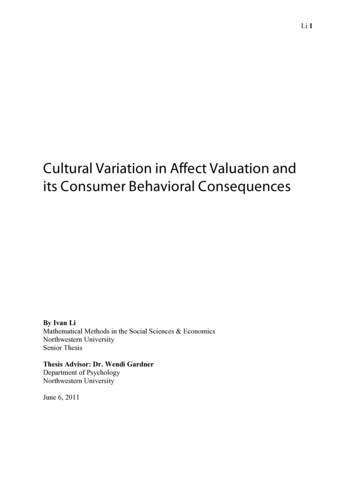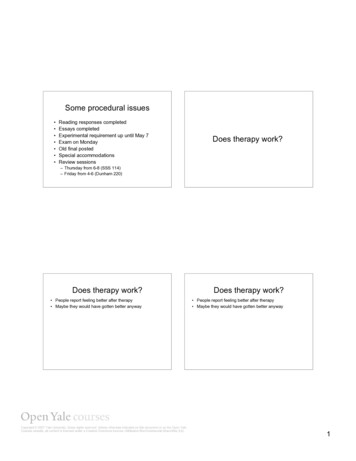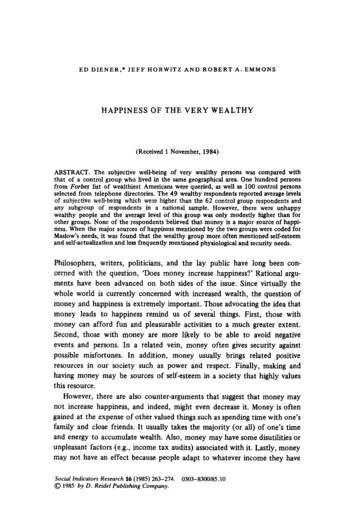
Transcription
ED D I E N E R , * J E F F HORWITZ AND R O B E R T A. EMMONSH A P P I N E S S OF T H E V E R Y W E A L T H Y(Received 1 November, 1984)ABSTRACT. The subjective well-being of very wealthy persons was compared withthat of a control group who lived in the same geographical area. One hundred personsfrom Forbes list of wealthiest Americans were queried, as well as 100 control personsselected from telephone directories. The 49 wealthy respondents reported average levelsof subjective well-being which were higher than the 62 control group respondents andany subgroup of respondents in a national sample. However, there were unhappywealthy people and the average level of this group was only modestly higher than forother groups. None of the respondents believed that money is a major source of happiness. When the major sources of happiness mentioned by the two groups were coded forMaslow's needs, it was found that the wealthy group more often mentioned seN-esteemand self-actualization and less frequently mentioned physiological and security needs.Philosophers, writers, politicians, and the lay public have long been concerned with the question, 'Does money increase happiness?' Rational arguments have been advanced on both sides of the issue. Since virtually thewhole world is currently concerned with increased wealth, the question ofmoney and happiness is extremely important. Those advocating the idea thatmoney leads to happiness remind us of several things. First, those withmoney can afford fun and pleasurable activities to a much greater extent.Second, those with money are more likely to be able to avoid negativeevents and persons. In a related vein, money often gives security againstpossible misfortunes. In addition, money usually brings related positiveresources in our society such as power and respect. Finally, making andhaving money may be sources of self-esteem in a society that highly valuesthis resource.However, there are also counter-arguments that suggest that money maynot increase happiness, and indeed, might even decrease it. Money is oftengained at the expense of other valued things such as spending time with one'sfamily and close friends. It usually takes the majority (or all) of one's timeand energy to accumulate wealth. Also, money may have some disutilities orunpleasant factors (e.g., income tax audits) associated with it. Lastly, moneymay not have an effect because people adapt to whatever income they haveSocial Indicators Research 16 (1985) 263-274.( ) 1985 by D. Reidel Publishing Company.0303-8300/85.10
264ED DIENER ET AL.so that the things money can buy bring only brief happiness. Aspirations mayeventually rise so that higher income is still not high enough.Given the contradictory arguments above, we are fortunate to have empirical evidence on the issue (Diener, 1984). Of course there are wealthy peoplewho are unhappy and poor people who are happy. However, because manyfactors besides money influence happiness (e.g., family life), one cannot relyon anecdotal reports about single individuals since other factors may outweigh the influences of money on their happiness. To ascertain the effect ofmoney per se, one must examine the average level of happiness in poorer andricher persons. A host of studies in the past several decades and in variouscountries (Andrews and Withey, 1976; Campbell, Converse and Rodgers,1976; Larson, 1978) have all found that within countries those persons whohave more money are happier on the average. Easterlin (1974), in a review of30 studies, found that in every single study, richer people reported higheraverage levels of happiness than poorer people. Thus, there is extensiveevidence for the connection between money and subjective well-being.However, when one turns to longitudinal evidence over time within a society,the conclusion becomes more complex. Happiness reports have not risenwithin the U.SI from the post World War II period to the present (Campbell,1981; Diener, 1984; Easterlin, 1974), even though real income (after taxesand inflation) has increased dramatically during that period. One potentialreason for this is that post World War II America had already reached a plateaubeyond which increasing income no longer mattered. However, even in thelowest income quartile there has been no increase in happiness over the years(e.g., Campbell, !981), and it is doubtful that these poor persons have for thelast sdveral decades been above the minimal level beyond which income doesnot matter. Perhaps a more plausible explanation is that the effect of moneyis relative. Those who have more or less money than those around them arelikely to be more or less happy respectively than those around them. However, as the overall level of income rises, the richest and poorest persons stillhave those relative positions within their societies regardless of the overallincome level. Thus, according to this explanation of the data, money does notmake people happy because it gives them buying power per se; rather theytend to become happier if they have more money than others. This socialcomparison approach to money and happiness is consonant with both thecross-sectional and longitudinal findings.The present study was designed to answer several questions related to
HAPPINESS OF THE VERY WEALTHY265money and happiness. First, are the 'super-rich' happy? Past research hasrelied on random samples, and therefore the number of wealthy personsincluded in these studies had undoubtedly been very small. Do the findingsfrom the upper quartile of income group extrapolate to the very wealthy?Because recognizable wealth undoubtedly carries its own peculiar benefitsand costs, it is unclear whether the very wealthy should be happy. In addition, one can compare the very wealthy group to persons in the upper incomegroup in national random samples. If the happiness reported by the wealthyexceeds that of the merely well-off, doubt would perhaps be cast on theminimal income level plateau hypothesis because it seems likely that the welloff group has already exceeded such a minimum.A second question addressed by this study is whether people believemoney causes happiness or unhappiness. Regardless of the time relationshipbetween the two, people may hold beliefs based on cultural norms aboutmoney and happiness that do not necessarily correspond to the 'facts'. Inaddition, one can ask about the relationship of happiness to these beliefs. Inother words, are persons with certain beliefs about the causes of subjectivewell-being happier than others?The final purpose of the study was to examine the hypothesis that peoplewith more money are happier because they are working for higher levelneeds. Maslow (1954) has proposed a need hierarchy theory in which needsemerge in a specific order. The physiological needs (e.g., air, water, sex) comefirst and, according to the theory, must be satisfied before the person moveson and becomes concerned with higher needs. The need for safety andsecurity arises next. After these two basic levels have been met, needs arise inthe following order: love (belonging and friends), esteem (respect of othersand self-esteem), and self-actualization (fulfilling one'S potential and expanding one's competencies). In the present study we sought to determine ifwealthy and non-wealthy individuals held different beliefs about the causesof happiness. We predict that wealthy persons, for whom physiological andsecurity needs are probably less of a problem, will be more concerned withhigher level needs such as self-actualization. Thus, wealthy individuals oughtto mention these higher order needs as causes of happiness more often thannon-wealthy individuals.Although money can be measured objectively, the meaning of 'happiness'is neither clear nor easily measurable. People have used the term happiness toapply to a number of different ideas. However, social scientists have deter-"
266ED DIENERET A.L.mined that there are at least three major components to a person's subjectivewell:being: life satisfaction, positive affect (e,g., joy), and an absence ofnegative affect (e.g., depression) (Andrews and Withey, 1976). Diener, Larsen,Levine, and Emmons (in press) have suggested that another promising subjective well-being variable is the percent of time the person is happy. These'constructs have been defined by scientists and valid measures exist for assessing them (see Diener, 1984; Larsen, Diener, & Emmons, 1983). Thus, in thepresent study we measured a number of constructs which may be thought ofas individual components of the more global construct of subjective wellbeing or happiness.In summary, the present study had several purposes. We wanted to determine the happiness level of very wealthy persons and to compare this to thehappiness of others, especially to well-off persons with above average income.We also wanted to explore whether persons believe that money causes happiness and to examine the relationship between beliefs about happiness andactual level of subjective well-being of the person. Finally, we wanted todetermine whether wealthy people are concerned with different types ofneeds than the nonwealthy, and whether such concerns correlate with levelof happiness.METHODParticipantsOne-hundred wealthy persons from the Forbes 1983 list and one-hundredcontrol persons were contracted by mail. The 1983 Forbes magazine listcontains the 400 wealthiest Americans (those with a net worth of 125million or more). Thus, the list contains many of the wealthiest people in theworld. In most cases their annual income should exceed 10 million dollars.We selected 100 persons from the Forbes list based on our ability to locatethe addresses of these persons. We wanted to include a preponderance ofhome addresses rather than office addresses because we felt that the returnrate might be much higher for the former. Addresses were obtained fromWho's Who and from telephone directories. Several surveys were returneduncompleted because the addressee was deceased or incapacitated. Surveyswere sent to additional persons to bring the total sample to 100. In the finalsample there were 85 home addresses and 15 office addresses.
HAPPINESS OF THE VERY WEALTHY267Although the responses were anonymous, postmarks indicated the geographical location from which the surveys were returned. Several areas wereheavily represented in the returns: New York City, Texas, and Florida.However, it should be noted that a disproportionate number of the Forbes400 comes from these areas. As a whole, the returns came from big cities andsmall towns from all over the U.S. The fn'st mailing went out in November,1983 and contained a letter explaining the importance of the study. A secondmailing was sent to all 100 in February, 1984. The second request reiteratedthe importance of the study and included a second questionnaire for thosewho had not returned the first one. Overall, a response rate of approximatelyone-half (49 respondents) was obtained, which is not low when one considersthe time commitments of, and frequent requests received by these wealthypersons.The comparison group was selected based on matching by geographicallocation. For each wealthy person contacted, a comparison person wasselected from the same geographical location. From the phone book of thegeographical locale where each wealthy person resided, a name was selectedat random. Thus, 100 persons were selected for comparison to the wealthygroup based upon geographical proximity of residence. All non-wealthypersons were contacted at home addresses. The first mailing went to t h i sgroup in February, 1984 and the second mailing was sent in March, 1984.Sixty-two persons from this gro p returned the questionnaire.For both groups of participants, the letters were addressed to Mr. andMrs. .The letter instructed participants that either the husband or wifecould complete the questionnaire. Since all returns were anonymous, it wasnecessary that all persons receive two mailings. Thus, it is possible that in afew cases both the husband and wife in one household completed the questionnaire.Measuring InstrumentThe questionnaire was identical for the two groups except for three questions.The wealthy group was asked whether their wealth was self-made, inherited,or a combination of both. The comparison group was asked their familyannual income and net worth. One multiple choice question and one shortessay questio n concerned beliefs about the degree to which money leads tohappiness or unhappiness. A number of questions were concerned with the
268ED DIENERJ T A L .happiness and life satisfaction of the respondent. One question asked for thepercentage of time the respondent is happy, unhappy, and neutral (Fordyce,1977). On this question, the percentages must sum to 100%. Another question taken from Andrews and Withey (1976) inquired, 'How do you feelabout how happy you are?' This question was answered on a scale rangingfrom seven ('Delighted') to one ('Terrible') and we refer to this as the Delighted-Terrible (D-T) scale. National norms are available for this scale. Thenext nine items were answered on a scale from 0 ('Not at all') to 6 ('Extremelymuch'). Each item asked subjects to indicate the degree to which they experienced particular emotions during their life. The first item was, 'Satisfiedwith your life' and was designed to assess the degree to which respondentsjudged their life in positive terms. The next eight questions were concernedwith mood; there were four positive affect and four negative affect adjectives.The four positive mood adjectives were: 'happy', 'joyful', 'pleased', and'fun/excitement'. The four negative adjectives were 'depressed', 'unhappy','angry or frustrated', and 'worried/anxious'. The responses on these twosets of adjectives were summed to yield separate positive and negative affectscores. These composite affect scales have reliabilities which approach 0.90(Larsen et al., 1983). Thus, there were five measures reflecting various meanings of happiness: percent of time happy, the delighted-terrible measure ofhappiness, life satisfaction, and average levels of positive and negative affect.The self-report measures of happiness have received a fair amount of validational support (e.g., Larsen, Diener, and Emmons, 1984), including somecorrelates with nonself-report measures (e.g., see Diener, 1984).Two open-ended short essay questions asked subjects their opinion aboutthe major sources of happiness and unhappiness in life. These responses wererated as to the degree to which they reflected each of Maslow's (1954)needlevels: physiological, safety, love and belonging, esteem, and self-actualization. Seven raters who were thoroughly familiar with Maslow's theory ofneeds rated the answer of each respondent to the question, 'What do youbelieve are the major sources of happiness in life?' The raters estimated thedegree to which the responses reflected each need level on a scale ranging from0 ('Not at all related') to two ('Clearly related to that need'). The averageagreement between raters for each need level was: physiological, r 0.94;safety, r 0.67; love, r 0.90; esteem, r 0.51; and self-actualization, r 0.55. The average rating of all six raters was used to reflect the need scores ineach category for each respondent. The respondent's age and sex was also
269H A P P I N E S S OF THE V E R Y W E A L T H Yrequested. The questionnaire was purposefully kept very brief (one page) inorder to insure a higher response rate.RESULTSThe number of respondents for various analyses reported below varies since afew subjects either failed to complete all questions or incorrectly completedthem. The average age of the wealthy group was 65.8, with 38 of the 49respondents being males. In the comparison group the average age was 45.6,with 36 of the 62 respondents being male. The mean family income andaverage net worth, respectively, reported by the nonwealthy group was 36 000 and 122 000. Within samples, sex has a near zero and nonsignificantcorrelation with the happiness measures. Age did not correlate in a replicablepattern across the two groups with percent of time happy, with the D-Tscale, or with life satisfaction. However, age correlated inversely with bothpositive and negative affect in both groups (wealthy, r's -0.41 and -0.19;nonwealthy r's -0.35 and -0.41). This finding is consonant with Diener,Sandvik, and Larsen's (1985) conclusion that average levels of both positiveand negative affect decrease with age because emotional intensity declineswith age.The wealthy and nonwealthy groups were compared on the various measures of happiness. The means, standard deviations, and significance levels canbe seen in Table I. Notice that the wealthy group reported greater levels ofTABLE IMeans of the subjective well-being measuresMeasuresPercent of time happyDelighted-TerribleLife SatisfactionSum positive affectSum negative affectWealthy(N ffi49)Non-Wealthy(N e: Standard deviations are shown in 0.01
270ED D I E N E R E T A L .subjective well-being on all measures, although the difference between thegroups failed to reach significance for positive affect. In addition, the level ofincome reported by the non-wealthy groups was correlated with their happiness iia order to replicate earlier findings that income in random populationscorrelates with subjective well-being. These correlations were: % happy, r 0.12; D-T, r 0.21; life satisfaction, r 0.15; summed positive affect, r 0.28, p 0.05; and summed negative affect, r 0.07. Thus, the correlationsbetween income and happiness within the non-wealthy group tended to bepositive, but low and nonsignificant. Finally, the happiness of both groupswas compared on the Delighted-Terrible Scale to means reported by Andrewsand Withey (1976) for a national random sample. In the national sample thehighest socioeconomic (SES) quintile (based on income and education) had amean score of 5.6 and the low SES group an average of 5.3. In the nationalsample, persons 65 years of age and older averaged 5.4. Thus, our wealthygroup is very happy in comparison to a similar age national sample and alsohappier than the well.off group. Indeed, our wealthy group showed a meanhigher than that for any group reported on by Andrews and Withey. Ournonwealthy group scored slightly lower than the national group mean of5.45.It appears that the wealthy group was, on the whole, very happy. However, it should be noted that the non-wealthy group showed a preponderanceo f happiness and was not lower than the wealthy group by large amounts.Indeed, there were many persons in each group who were lower than themean for the other group. For example, in the wealthy group this percentagewas 37% and in the nonwealthy group it was 54% for the D-T scale. Inother words, 37% of the wealthy group reported less happiness on the D-Tscale than the average nonwealthy person. Thus, .although money may aidhappiness, it certainly is no guarantee of happiness and explains only a smallfraction of the variation in happiness reported by Americans. When individuals are examined, there are several wealthy persons who are less happy. Oneman with enormous self-made wealth said he could never remember beinghappy at any period in his entire life. A wealthy woman reported being unhappy because of problems her children have encountered. Thus, the influenceof money clearly can be overridden by h e r problems. There are a number ofthe non-wealthy who are extremely happy. Indeed, 45% of the nonwealthyindicated either a 6 or 7 on the Delighted-Terrible scale, suggesting very highlevels of happiness in the absence of wealth.
HAPPINESSOF THE VERYWEALTHY271The beliefs about the causes of happiness are varied, but one thing is clear:money is rarely mentioned. The causes of happiness that were mentionedmost frequently were good family and friends, achieving goals, a relationshipwith God, and good health. Others mentioned psychological factors such as awealthy man who wrote that "Happiness is an attitude", and another whowrote, "What you make of your life in your mind will influence your happiness."When asked to check off the influence of money on happiness, 77% of thewealthy group and 61% of the nonwealthy group selected the option whichstated that 'Money can increase OR decrease happiness, depending on how itis used'. The option, 'Increase happiness, but other factors may outweigh it',was selected by 17% of the wealthy group and 28% of the nonwealthy group.Not a single person thought that money guarantees happiness and one wealthyperson chose 'Money makes it harder to be happy'. Thus, there was a strongsentiment in both groups that money can be helpful to happiness if usedcorrectly, but that it is no guarantee of happiness. One 40 year old man withan income of 25 000 wrote, "Money and happiness bear little, if any, relationto each other". The group differences in happiness reported earlier tend tosupport these beliefs. To the open-ended questions, a number of personsindicated that money helped because it allows activities such as travel. Anumber of wealthy people specifically mentioned that money provided theopportunity to help others and improve the world. Another common themewas that money provides greater freedom and choice in one's activities andfriends. Although nobody cited money as a major source of life happiness,8 4 % of the wealthy group and 39% of the nonwealthy group mentionedpositive aspects of having money. Problems associated with the lack of moneywere mentioned by 37% of the non-wealthy group, but none of the wealthygroup. A number of the non-wealthy mentioned problems that a lack ofmoney can create such as worry and family arguments. However, severalothers mentioned that dramatic increases or decreases in their income had notbeen accompanied by concommitant long-term changes in their happiness. Insummary, a number of persons mentioned the problems that lack of moneycan bring and others mentioned the pleasant activities that money can helpprovide. But the overall tenor of the answers within both groups can besummed up by the respondent who wrote that money has much less importance than other factors such as being loved and being useful.Lastly, we turn to the relation between Maslow's needs and wealth. Each
272ED D I E N E R E T A L .TABLE IIMean ratings of respondents' answers by need categoriesNeed CategoriesWealthy (N 49)Nonwealthy (N 0.440.241.330.660.710.760.391.250.460.55Note: 0 Answer not all related to this need; 1 Answer probably reflectsthis need; and 2 Answer definitely reflects this need.respondent's answer to the question o f what makes people happy was codedfor each o f Maslow's need categories. The assumption was that people wouldtend to mention needs that were important to them. However, this connection is certainly not a perfect one since people may mention particular needsbased on their observations o f others. The averages for each need level forthe two groups are shown in Table II. Ratings of each category were doneindependently o f ratings for the other categories. There was a near significantinteraction between group and need level, F (4,380) 2.31, p 0.06, suggesting that the non-wealthy were more concerned with needs lower inMaslow's hierarchy and the wealthy were more concerned with needs such asesteem and self-actualization. The major physiological need mentioned was'health'. Given the older age o f the wealthy group, it is surprising that theyactually mentioned this category less frequently. However, it can be seen thatthe most frequent need category in both groups was love, including closefriends and family. A preponderance o f people in both groups mentioned thiscategory as critical to happiness.Was happiness related to the types of things the respondent thought wereimportant to happiness? When the Maslow need ratings were correlated withthe various subjective well-being measures, there was virtually no correlationbetween the two. In other words, happiness was not related to whether aperson mentioned health, family, or self-actualization as the major source o flife happiness. Thus, the hypothesis that wealthy people might be moreconcerned with higher level needs was supported. However, what needs theperson seemed to be concerned with were not related to his or her happiness.
HAPPINESS OF THE VERY WEALTHY273DISCUSSIONThe findings of the present study replicate and expand past findings whichhave shown a cross-sectional correlation between money and happiness.Indeed, the very wealthy group in our study reported higher levels of happiness than any subgroup in a national random survey conducted by Andrewsand Withey (1976). However, as in past studies, the effect of money onsubjective well-being is, across people, not very strong. Of course wealth orlack of money may be very large sources of happiness or unhappiness forcertain individuals. However, there is an enormous overlap in the distributionof happiness reports of wealthy and non-wealthy persons. A majority ofindividuals hold a belief consonant with this finding - namely, that moneycan help one's happiness to some extent but there are other factors that aremore important. Our findings suggest that money does free individuals tosome extent from certain worries, and from a strong concern for physiological and security needs. However, new needs emerge for wealthy persons and itmay be their success at these that influences their happiness.Why is the wealthy group on the whole so happy? It may be due to thepleasant events, prestige, and self-esteem that wealth brings. However, thereare alternative explanations. For example, it could be that these persons werealways very happy and this was one cause of their wealth, rather than viceversa. Perhaps a more plausible explanation is that the wealthy people havebeen very involved with their work which is exciting. They are probably highlymotivated and goal-directed and their work may be a type of 'flow activity'(Csikszentmihalyi, 1975). This explanation suggests that the activity leadingto the money, rather than the spending power of the money, is responsiblefor the wealthy group's high level of subjective well-being. At present, thedata are not available that would allow us to choose among these hypotheses.The present findings cast doubt on one approach to the relationshipbetween money and happiness - the idea that there is some minimum level ofmoney beyond which it makes no difference (Freedman, 1978). The hypothesis is that money makes a difference at poverty levels because people areunhappy if they cannot meet their basic needs. However, above this minimumlevel, money simply adds luxuries that do not add to happiness. Because ourwealthy group was higher in happiness than the high income group in Andrewsand Withey's (1976) study, it would appear that even the top quintile ofAmericans has not reached the hypothetical plateau beyond which income
274ED DIENER E T A L .has no effect. Of course it is possible that the m i n i m u m level or plateau levelis extremely high, and therefore even Andrew and Withey's top income grouphad not reached it. This could be so, but this level is certainly not tied then tobasic needs. A more plausible alternative is that the happiness plateau forincome comes at a point where the individual can have the goods which aredefined by his or her subculture as being important. If this is true, there is noabsolute level beyond which income will make no difference. But the encouraging finding from the point of view of happiness is that income appears tobe only a minor influence on the happiness of most individuals. One goal forfuture research and theory is to determine why income has any influence onsubjective well-being.BIBLIOGRAPHYAndrews, F.M., and S.B. Withey: 1976, Social Indicators of Well-Being: America'sPerception of Life Quality (Plenum, New York).Campbell, A: 1981, The Sense of Well-Beingin America: Recent Patterns and Trends(McGraw-Hill, New York).Campbell, A., P. E. Converse, and W. L. Rodgers: 1976, The Quality of American Life(Russell Sage, New York).Csikszentmihalyi, M.: 1975, Beyond Boredom and Anxiety (Jossey-Bass, San Francisco).Diener, E.: 1984, 'Subjective Well-Being',Psychological Bulletin 95, pp. 542-575.Diener, E., R. J. Larsen, S. Levine, and R. A. Emmons: 1985, 'Intensity and frequency:Dimensions underlying positive and negative affect', Journal of Personality and SocialPsychology 48, in press.Diener, E., E. Sandvik and R. J. Larsen: 1985, 'Age and sex affects for emotional intensity', Developmental Psychology, in press.Easterlin, R. A.: 1974, 'Does economic growth improve the human or? Some empiricalevidence', in P. A. David and M. W. Reder (eds.), Nations and households in economic growth (Academic Press, New York), pp. 89-125.Fordyce, M.W.: 1977, 'The happiness measures: A sixty second index of emotionalwell-being and mental health', unpublished paper, Edison Community College, FortMyers, Florida.Freedman, J.: 1978, Happy People: What Happiness Is, Who Has It, and Why. (Harcourt,New York).Larsen, R.J. and E. Diener: 1984, 'A multitrait, multimethod examination of affectstructure: Hedonic level and emotional intensity', Personality and Individual Differences, in press.Larsen, R. J., E. Diener and R. A. Emmons: 1983, 'Validity and meaning of measures ofsubjective well-being', paper presented at the annual meeting of the MidwesternPsychological Association, Chicago.Larson, R.: 1978, l'hirty years of research on the subjective well-being of older Americans', Journal of Gerontology 33, pp. 109-125.Maslow, A. H.: 1954, Motivation and Personality (Harper & Row, New York).* Psychology Department, University o f Illi
minimal income level plateau hypothesis because it seems likely that the well- off group has already exceeded such a minimum. . being or happiness. In summary, the present study had several purposes. We wanted to deter- mine the happiness level of very wealthy persons and to compare this to the happiness of others, especially to well-off .




